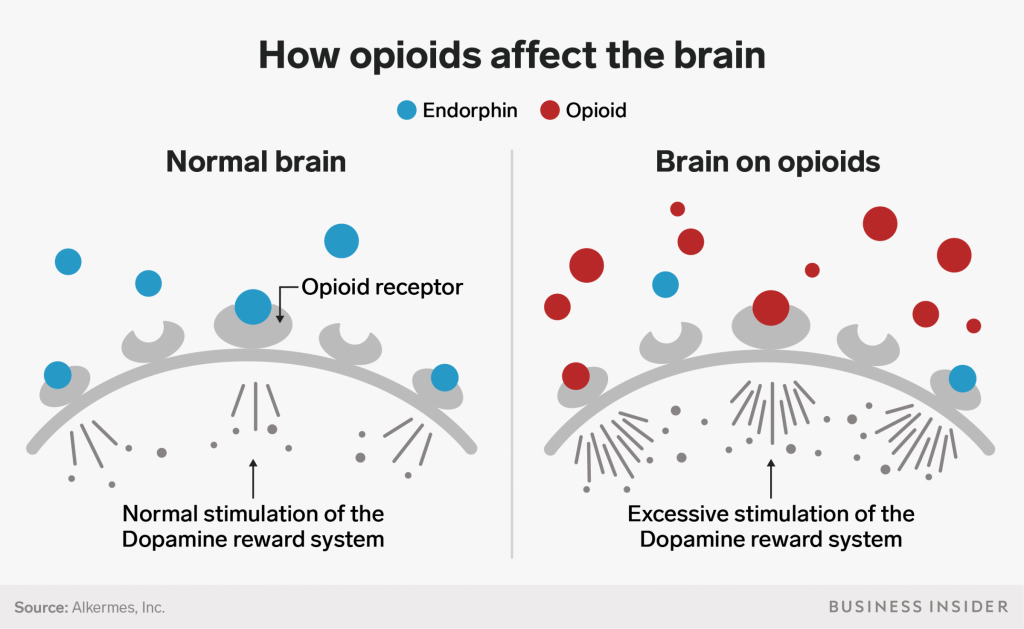Opiates have been used for centuries to alleviate pain and provide relief for medical conditions. But how do opiates actually work to produce these effects? In this article, we will explore the science behind opiates, including how they interact with the body and the potential risks associated with their use. We will also discuss the different types of opiates and their effects on the body. Whether you are a medical professional or just curious about how opiates work, this article will provide you with all the information you need.

Contents
What are Opiates?
Opiates are narcotic compounds derived from the opium poppy plant, Papaver somniferum. They are a type of medication used to treat pain and various other medical conditions. Opiates work by binding to opioid receptors in the central nervous system and brain to produce a variety of effects, such as pain relief, sedation, and euphoria. The most common opiates include codeine, morphine, heroin, and oxycodone.
How Do Opiates Work?
Opiates work by binding to specific opioid receptors in the brain and central nervous system. These receptors are responsible for controlling the body’s perception of pain, along with other functions such as stress, anxiety, and reward. When opiates bind to these receptors, they can produce a variety of effects, such as pain relief, sedation, and euphoria.
How Opiates Affect the Brain
When opiates bind to the opioid receptors in the brain, they trigger a cascade of neurological events that can have profound effects on the brain and body. Opiates can cause an increase in dopamine levels in the brain, which is associated with feelings of pleasure and reward. This can lead to a phenomenon known as “euphoria,” which is characterized by feelings of intense pleasure. Additionally, opiates can also reduce the body’s perception of pain, as well as produce feelings of sedation and relaxation.
Types of Opiates
Opiates can be divided into two main categories: natural and synthetic. Natural opiates are derived directly from the opium poppy and include codeine, morphine, and heroin. Synthetic opiates are chemically manufactured drugs, such as oxycodone, hydrocodone, and hydromorphone. These drugs have similar effects to natural opiates, but are often more potent and can have a higher risk of abuse.
Side Effects of Opiates
Opiates can have a variety of side effects, including constipation, nausea, confusion, and drowsiness. Additionally, long-term use of opiates can lead to physical dependence, which can result in withdrawal symptoms when the drug is stopped. It is important to talk to a doctor before taking any opiate medications, as these drugs can be highly addictive and can lead to serious health complications if abused.
Risks of Opiates
Opiates can be highly addictive and can lead to serious health complications if abused. Long-term use of opiates can lead to physical dependence, and can cause withdrawal symptoms when the drug is stopped. Additionally, opiates can interact with other medications, so it is important to talk to a doctor before taking any opiate medications.
Treatment for Opiate Addiction
Treatment for opiate addiction typically involves a combination of medication, counseling, and support groups. Medications such as methadone and buprenorphine can help reduce cravings and withdrawal symptoms, and allow the patient to focus on the psychological aspects of addiction. Additionally, counseling and support groups can provide the patient with the tools and support needed to stay sober and rebuild their lives.
Few Frequently Asked Questions
What Are Opiates?
Opiates are a group of drugs derived from the opium poppy plant. They are usually prescribed for pain relief, but are also used recreationally for their euphoric and sedative effects. Common opiates include morphine, codeine, oxycodone, and heroin. Opiates can be taken orally, injected, or inhaled.
How Do Opiates Work?
Opiates work by binding to opioid receptors in the brain and body. These receptors are involved in pain perception and reward pathways. When opiates bind to these receptors, they activate the release of endorphins and other neurotransmitters that produce a sense of pleasure and well-being. Opiates also block the transmission of pain signals to the brain, providing pain relief.
What Are the Side Effects of Opiates?
The most common side effects of opiates are drowsiness, dizziness, nausea, constipation, and respiratory depression. Long-term use of opiates can also lead to tolerance, physical dependence, and addiction. Other risks associated with opiate use include overdose, impaired coordination, and slowed reflexes.
What Are the Risks of Abusing Opiates?
The risks of abusing opiates are numerous and serious. Abusing opiates can lead to addiction, overdose, impaired cognitive functioning, depression, and even death. Additionally, long-term opiate use can impair the respiratory system, result in organ damage, and increase a person’s risk of infection.
What Are Some Alternatives to Opiates?
There are many alternatives to opiates that can be used to manage pain, including non-opioid medications, such as NSAIDs and acetaminophen, as well as non-drug therapies, such as acupuncture, massage, and physical therapy. Additionally, there are many non-medicinal strategies, such as cognitive-behavioral therapy, that can be used to treat chronic pain.
How Can Opiate Addiction Be Treated?
Opiate addiction can be treated with a combination of medications, counseling, and behavior therapies. Medications such as methadone, buprenorphine, and naltrexone can be used to reduce cravings and withdrawal symptoms. Counseling, such as cognitive-behavioral therapy, can help individuals to identify and address the underlying causes of their addiction. In addition, 12-step programs and other support groups can provide individuals with the emotional and social support they need to maintain sobriety.
This Is What Happens to Your Brain on Opioids | Short Film Showcase
In conclusion, opiates are powerful drugs that work by binding to opioid receptors in the brain and body. When used properly, they can be an effective tool for managing pain. However, it is important to recognize the dangers of opiate addiction and misuse, as it can cause significant physical and psychological harm. With careful monitoring and guidance from a qualified medical professional, opiates can be used safely and effectively to manage pain.

